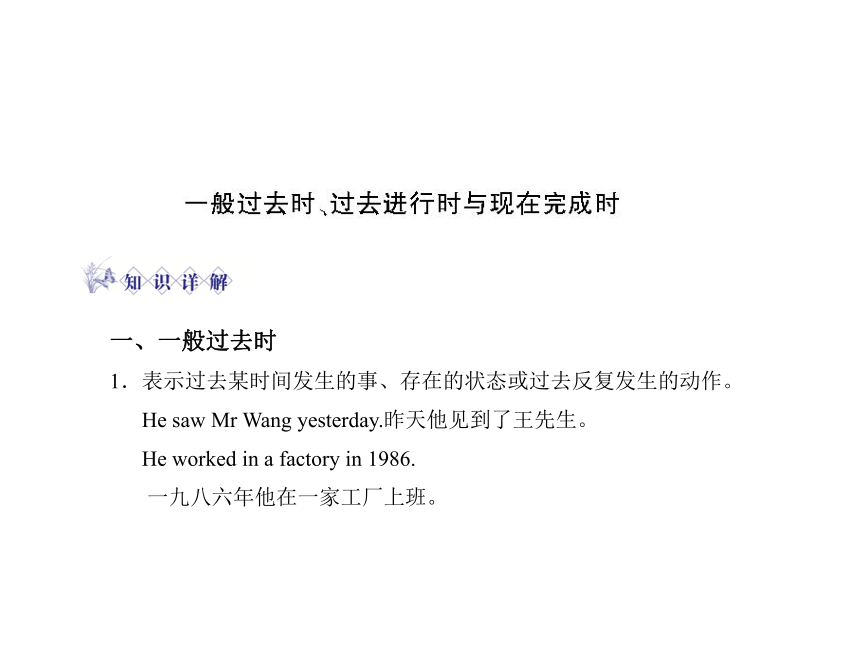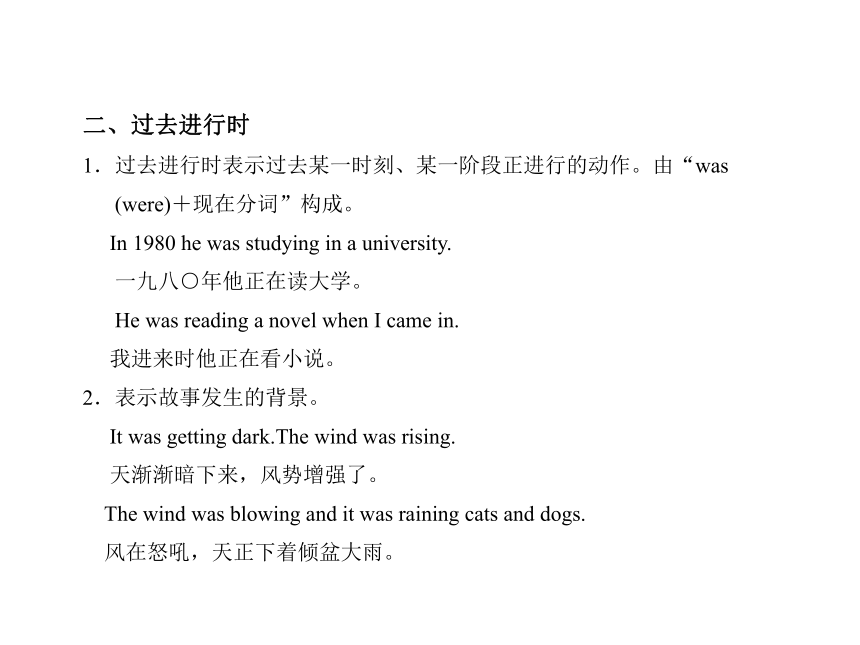unit 2 heroes语法突破
图片预览







文档简介
课件15张PPT。一、一般过去时
1.表示过去某时间发生的事、存在的状态或过去反复发生的动作。
He saw Mr Wang yesterday.昨天他见到了王先生。
He worked in a factory in 1986.
一九八六年他在一家工厂上班。2.表示过去经常发生的动作,也可用“used to”和“would+动词原形”。
I used to smoke.我过去抽烟。
During the vacation I would swim in the sea.
假期里我常去海里游泳。
used to表示过去常发生而现在不再发生的动作或存在的状态。另外“be used to+名词(动名词)”,表示“习惯于……”。
I am used to the climate here.我习惯了这里的气候。
He is used to swimming in winter.他习惯了冬季游泳。二、过去进行时
1.过去进行时表示过去某一时刻、某一阶段正进行的动作。由“was
(were)+现在分词”构成。
In 1980 he was studying in a university.
一九八○年他正在读大学。
He was reading a novel when I came in.
我进来时他正在看小说。
2.表示故事发生的背景。
It was getting dark.The wind was rising.
天渐渐暗下来,风势增强了。
The wind was blowing and it was raining cats and dogs.
风在怒吼,天正下着倾盆大雨。3.过去进行时表示预计的、安排的将来的动作。
He said he was visiting me this evening.
他说他今晚来看我。
Nobody knew whether they were coming.
没人知道他们会不会来。
4.过去进行时动词常与always,continually,frequently等词连用,表示过
去经常发生的行为,往往带有感彩。
I was always losing my keys.我老是掉钥匙。
He was continually asking questions.他老是提问题。
They were frequently quarrelling.他们老是吵架。三、现在完成时
现在完成时由“have+过去分词”构成。其使用有两种情况:
1.现在完成时所表示的动作在说话之前已完成,而对现在有影响,句中没有
具体的时间状语。
He has gone to Fuzhou.他去福州了。(说话人认为他不在原地。)
He has been to Fuzhou.他去过福州。(说话人认为他在原地。)
2.现在完成时表示的动作开始于过去,持续到现在,也许还会持续下去。常
用for和since表示一段时间的状语或so far,now,today,this week
(month,year)等表示包括现在时间在内的状语。
He has studied English for 5 years.
He has studied English since 1985.
Now I have finished the work. 表示短暂时间动作的词,如:come,go,die,marry,buy等的完成时不能与for,since等表示一段时间的词连用。
3.现在完成时还可用在时间和条件状语从句中,表示将来某时完成的动作。
I’ll go to your home when I have finished my homework.
If it has stopped snowing in the morning,we’ll go to the park. 现在完成时与一般过去时的区别:
(1)侧重点不同
现在完成时是与现在有关的时态,属现在时态范畴,它侧重于过去的动作对现在所造成的影响。而一般过去时是一种过去时态,侧重于表示过去的动作,与现在无关。
Yesterday I went to the zoo.
昨天我去了动物园。(仅说明昨天去了动物园,与现在无关)
Li Lei has read the book.
李雷已看过那本书。(说明李雷了解那本书的内容)(2)连用的时间状语不同
与现在完成时连用的时间状语有:already,yet,still,just,so far,in the last (past)...,before,ever,never,since...,for...等。与一般过去时连用的时间状语有:...ago,yesterday,last...,in 2000,just now等。
另外,现在完成时不可与yesterday,last week,two days ago等过去时间状语连用。
Have you ever picked flowers or stepped on the grass in a park?
你曾在公园里摘过花或踩过草地吗?
Father bought that watch ten years ago.
爸爸十年前买的那块手表。
I have never seen the film before.我以前从没看过这部影片。1.The man________his wallet on the way back home.
A.loses B.lost
C.is losing D.was lost
【答案】 B
2.A big earthquake happened when the kids________a birthday party.
A.are holding B.were holding
C.held D.hold
【答案】 B
3.He has been in a wandering life________he lost his job.
A.After B.from
C.since D.by
【答案】 C4.Susan decided not to work on the program at home because she didn’t
want her parents to know what she________.
A.has done B.had done
C.was doing D.is doing
【解析】 主要考查进行时的用法。根据句意“苏姗不愿让她父母知
道她正在做的事情”,知该空应填进行时态;又根据时态一致的原
则,应用过去进行时,所以选C项。
【答案】 C5.He was hoping to go abroad but his parents________that they won’t
support him unless he can borrow money from the bank.
A.were deciding B.have decided
C.decided D.will decided
【解析】 时态考查题。这是个由but连接的并列句。but后是个含
宾语从句的复合句。从宾语从句的谓语won’t support知主句的时
态不可能是过去时或过去进行时,排除A、C,也不会是将来时,
排除D,而只能是现在完成时。
【答案】 B6.Shelly________California for Texas in 1996 and________there ever since.
A.left;worked B.has left;had worked
C.left;has worked D.has left;worked
【答案】 C
7.—What happened to the postman?
—I don’t know.He________around here for a long time.
A.hasn’t seen B.didn’t see
C.wasn’t seen D.hasn’t been seen
【解析】 for a long time是完成时态的时间状语,邮递员应该是“被
看见”,所以要用现在完成时的被动语态。
【答案】 D8.In the past ten years,there________great changes in our hometown.
A.has been B.are
C.have been D.were
【解析】 in the past ten years常与现在完成时连用,根据changes判断谓
语动词用复数。
【答案】 C
9.—Where________the recorder?I can’t see it anywhere.
—I________it right here.But now it’s gone.
A.did you put;have put B.have you put;put
C.had you put;was putting D.were you putting;put
【解析】 第一空用现在完成时强调过去发生的事情对现在的影响;第二
空用一般过去时陈述过去的事实。
【答案】 B10.—Do you know our town at all?
—No,this is the first time I________here.
A.Was B.have been
C.came D.am coming
【解析】 在句型It/This is the first time+(that)从句中,从句应使用
现在完成时。
【答案】 B
1.表示过去某时间发生的事、存在的状态或过去反复发生的动作。
He saw Mr Wang yesterday.昨天他见到了王先生。
He worked in a factory in 1986.
一九八六年他在一家工厂上班。2.表示过去经常发生的动作,也可用“used to”和“would+动词原形”。
I used to smoke.我过去抽烟。
During the vacation I would swim in the sea.
假期里我常去海里游泳。
used to表示过去常发生而现在不再发生的动作或存在的状态。另外“be used to+名词(动名词)”,表示“习惯于……”。
I am used to the climate here.我习惯了这里的气候。
He is used to swimming in winter.他习惯了冬季游泳。二、过去进行时
1.过去进行时表示过去某一时刻、某一阶段正进行的动作。由“was
(were)+现在分词”构成。
In 1980 he was studying in a university.
一九八○年他正在读大学。
He was reading a novel when I came in.
我进来时他正在看小说。
2.表示故事发生的背景。
It was getting dark.The wind was rising.
天渐渐暗下来,风势增强了。
The wind was blowing and it was raining cats and dogs.
风在怒吼,天正下着倾盆大雨。3.过去进行时表示预计的、安排的将来的动作。
He said he was visiting me this evening.
他说他今晚来看我。
Nobody knew whether they were coming.
没人知道他们会不会来。
4.过去进行时动词常与always,continually,frequently等词连用,表示过
去经常发生的行为,往往带有感彩。
I was always losing my keys.我老是掉钥匙。
He was continually asking questions.他老是提问题。
They were frequently quarrelling.他们老是吵架。三、现在完成时
现在完成时由“have+过去分词”构成。其使用有两种情况:
1.现在完成时所表示的动作在说话之前已完成,而对现在有影响,句中没有
具体的时间状语。
He has gone to Fuzhou.他去福州了。(说话人认为他不在原地。)
He has been to Fuzhou.他去过福州。(说话人认为他在原地。)
2.现在完成时表示的动作开始于过去,持续到现在,也许还会持续下去。常
用for和since表示一段时间的状语或so far,now,today,this week
(month,year)等表示包括现在时间在内的状语。
He has studied English for 5 years.
He has studied English since 1985.
Now I have finished the work. 表示短暂时间动作的词,如:come,go,die,marry,buy等的完成时不能与for,since等表示一段时间的词连用。
3.现在完成时还可用在时间和条件状语从句中,表示将来某时完成的动作。
I’ll go to your home when I have finished my homework.
If it has stopped snowing in the morning,we’ll go to the park. 现在完成时与一般过去时的区别:
(1)侧重点不同
现在完成时是与现在有关的时态,属现在时态范畴,它侧重于过去的动作对现在所造成的影响。而一般过去时是一种过去时态,侧重于表示过去的动作,与现在无关。
Yesterday I went to the zoo.
昨天我去了动物园。(仅说明昨天去了动物园,与现在无关)
Li Lei has read the book.
李雷已看过那本书。(说明李雷了解那本书的内容)(2)连用的时间状语不同
与现在完成时连用的时间状语有:already,yet,still,just,so far,in the last (past)...,before,ever,never,since...,for...等。与一般过去时连用的时间状语有:...ago,yesterday,last...,in 2000,just now等。
另外,现在完成时不可与yesterday,last week,two days ago等过去时间状语连用。
Have you ever picked flowers or stepped on the grass in a park?
你曾在公园里摘过花或踩过草地吗?
Father bought that watch ten years ago.
爸爸十年前买的那块手表。
I have never seen the film before.我以前从没看过这部影片。1.The man________his wallet on the way back home.
A.loses B.lost
C.is losing D.was lost
【答案】 B
2.A big earthquake happened when the kids________a birthday party.
A.are holding B.were holding
C.held D.hold
【答案】 B
3.He has been in a wandering life________he lost his job.
A.After B.from
C.since D.by
【答案】 C4.Susan decided not to work on the program at home because she didn’t
want her parents to know what she________.
A.has done B.had done
C.was doing D.is doing
【解析】 主要考查进行时的用法。根据句意“苏姗不愿让她父母知
道她正在做的事情”,知该空应填进行时态;又根据时态一致的原
则,应用过去进行时,所以选C项。
【答案】 C5.He was hoping to go abroad but his parents________that they won’t
support him unless he can borrow money from the bank.
A.were deciding B.have decided
C.decided D.will decided
【解析】 时态考查题。这是个由but连接的并列句。but后是个含
宾语从句的复合句。从宾语从句的谓语won’t support知主句的时
态不可能是过去时或过去进行时,排除A、C,也不会是将来时,
排除D,而只能是现在完成时。
【答案】 B6.Shelly________California for Texas in 1996 and________there ever since.
A.left;worked B.has left;had worked
C.left;has worked D.has left;worked
【答案】 C
7.—What happened to the postman?
—I don’t know.He________around here for a long time.
A.hasn’t seen B.didn’t see
C.wasn’t seen D.hasn’t been seen
【解析】 for a long time是完成时态的时间状语,邮递员应该是“被
看见”,所以要用现在完成时的被动语态。
【答案】 D8.In the past ten years,there________great changes in our hometown.
A.has been B.are
C.have been D.were
【解析】 in the past ten years常与现在完成时连用,根据changes判断谓
语动词用复数。
【答案】 C
9.—Where________the recorder?I can’t see it anywhere.
—I________it right here.But now it’s gone.
A.did you put;have put B.have you put;put
C.had you put;was putting D.were you putting;put
【解析】 第一空用现在完成时强调过去发生的事情对现在的影响;第二
空用一般过去时陈述过去的事实。
【答案】 B10.—Do you know our town at all?
—No,this is the first time I________here.
A.Was B.have been
C.came D.am coming
【解析】 在句型It/This is the first time+(that)从句中,从句应使用
现在完成时。
【答案】 B
